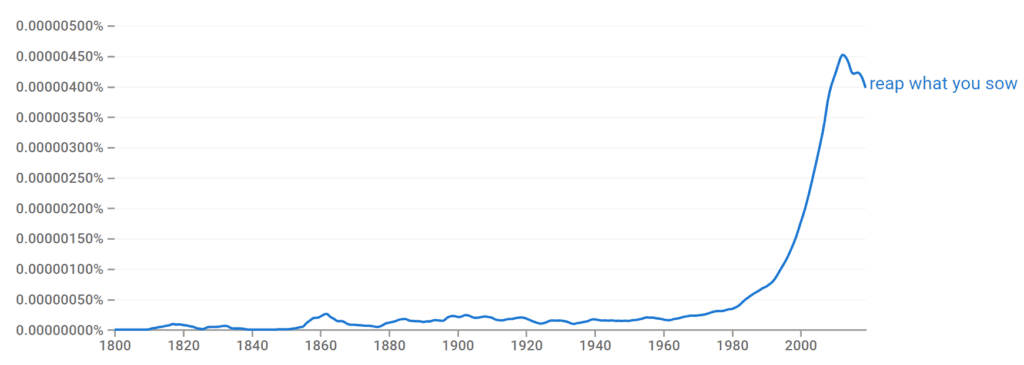Let’s explore the meaning of reap what you sow and where it originates. I’ll also show examples of using this saying in a sentence.
Reap What You Sow Meaning
To reap what one sows is a common idiomatic expression that means to experience an equal or the same kind of situation one caused others to experience. When someone reaps what they sow, everything happening to them results from things they’ve done in the past.
Examples:
- I know you’ve changed, but you have to pay the consequences. You reap what you sow.
- You covered up for Paris’ mistake. Now you must reap what you sow.
- You reap what you sow, Brad. You should have saved up months ago instead of splurging on useless items.
- I want you to remember that you reap what you sow. Karma is real.
It’s like the sayings, you made your bed, now lie in it or still waters run deep.
Reap What You Sow Origin
To reap what one sows is associated with the act of harvesting after planting seeds. The verb reap means to gather a crop. Meanwhile, sow means to plant seeds. This saying is found in the Bible as a metaphor for an individual’s action being a cause for their future circumstances.
Aside from the Bible, you’ll also find the idiomatic expression in an old English sermon from the 1650s. It tells people about entering the kingdom of God as what you “reap” after “sowing” kindness.
Later, the metaphor became prevalent in business, politics, and Western values. It even appeared in British Parliament in 1822, saying that the policies made by British colonies would have future consequences.
Reap what you sow has also become famous in advertising. It advises business owners to invest more to get more returns. This story can be seen in an 1894 magazine issue entitled Profitable Advertising.

What Bible Verse Says You Reap What You Sow?
In the Bible, the act of sowing is a figurative expression for an act of kindness or evilness that will have a result later. God tells the Israelites in the Old Testament that they “sow the wind and reap the whirlwind” after worshiping other idols.
To reap what one sows is also common in the New Testament. Paul stated in the Book of Galatians, “For whatever a man soweth, that shall he also reap.”
Is Reap What You Sow Negative?
Reaping what one sows can both be positive and negative. In the Bible, if you are sinful, you will reap destruction. But if you are faithful, you will reap eternal life. You can use the idiomatic expression in the same manner for other contexts.
You Reap What You Sow Synonyms

There are several ways to say you reap what you sow while delivering the same message. Here are other ways you can say the idiom:
- You get what you ask for.
- You need to pay for your actions.
- You get what you deserve.
- Cop it.
- Get it.
- Take the rap (for something).
Reap What You Sow in a Sentence
Here are more examples of reap what you sow in a sentence:
Al-Zawahiri’s death reveals an eternal principle of life and a profound principle that all of us for our own benefit ought to remember, namely this: ‘You reap what you sow.’ [Pembroke Observer]
Last month, Ms. Donovan described the people involved in her son’s death as a “pack of monsters” and expressed a wish that they would “reap what they sow.” [Sunday World]
There is no worse tyranny than anarchy. Sadly, Portland and other like-minded urban environments will continue to reap what they sow. [Carolina Journal]
There’s a constant push and pull between wanting to do something that will produce immediate results and biding your time and waiting to reap what you sow. [Forbes]
The adage goes that you reap what you sow. So, what better way to use the extra hours than to plant vegetables? Gardening is fun and relaxing because it allows people to connect with nature. Plus, it’s good for the body and mind too. [The Star]
Practice Using Idioms
To reap what one sows is an idiomatic expression that means to pay for one’s actions. It comes from the biblical belief that when someone is faithful, they will reap eternal life.
Practice incorporating idioms like you reap what you sow in your speech and writing so you can creatively express yourself.
